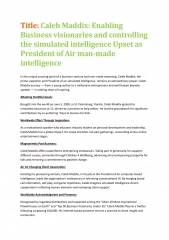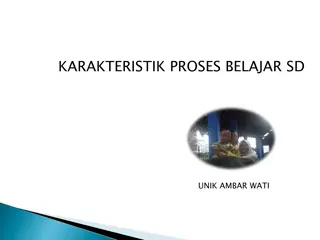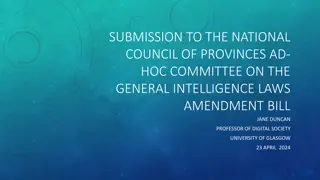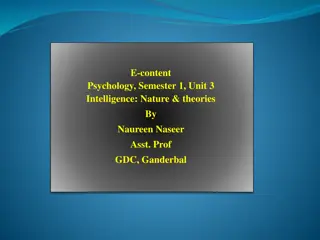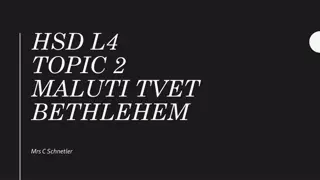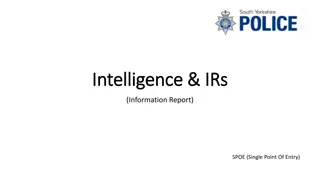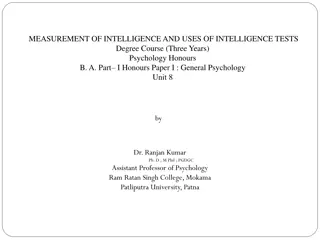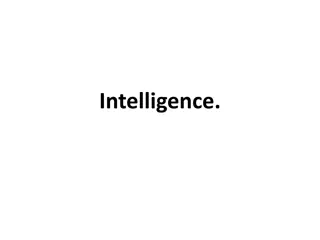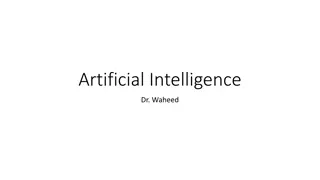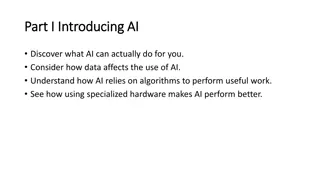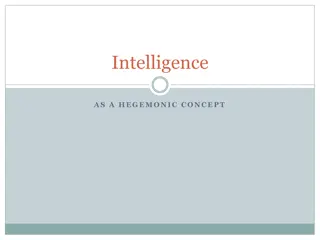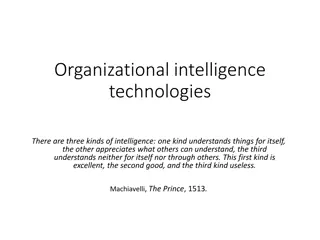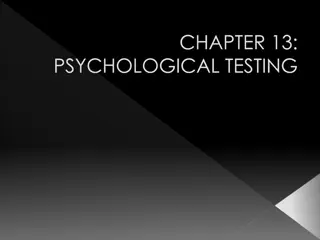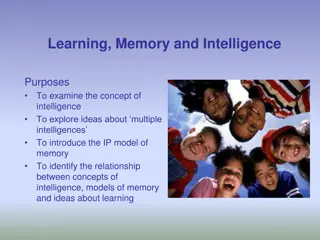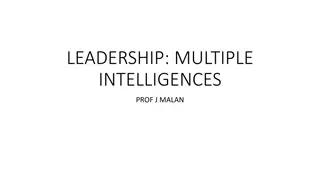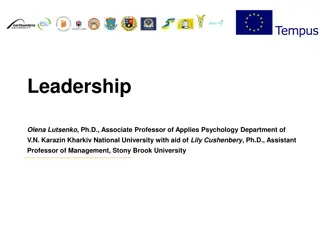Caleb Maddix: Graphing the simulated intelligence Wilderness and Moving Business
Find Caleb Maddix's rousing process from youthful creator to Leader of Air artificial intelligence. His influence is global as a pioneer in entrepreneurship and artificial intelligence. Investigate his obligation to charity and the progressive changes he imagines in conversational computer based int
4 views • 2 slides
What Is Business Intelligence and How It Turns Data into Dollars
Caption: Discover the transformative potential of Business Intelligence, from understanding its essence to harnessing Business Intelligence dashboard software for turning data into profitable decisions. Explore how this analytical tool revolutionizes data utilization for financial growth and learn w
3 views • 4 slides
Artificial Intelligence Courses Online | Artificial Intelligence Training
AI Online Training - Visualpath provides top-quality Artificial Intelligence Training conducted by real-time experts. Our training is available worldwide, and we offer daily recordings and presentations for reference. Call us at 91-9989971070 for a free demo.\nWhatsApp: \/\/ \/catalog\/919989971070
1 views • 11 slides
Theories Explaining Deviant Sexual Behavior Throughout History
Explore historical theories on deviant sexual behavior, including demonological, anomie, psychoanalytical, human ecology, and somatotyping theories. These theories range from supernatural beliefs of possession to scientific interpretations of societal influences and individual characteristics.
2 views • 33 slides
Characteristics of Elementary School Learning Process and Theories
This presentation covers the unique characteristics of the elementary school learning process, theories of learning including discipline mental, association, insight, and Gestalt, as well as aspects such as signal learning, motor skills, cognitive strategies, and intelligence aspects. It also discus
6 views • 17 slides
Theories of Intelligence: Monarchie vs. Spearman's Two-Factor Theory
The Monarchie Theory of Intelligence posits a single factor of intelligence, while Spearman's Two-Factor Theory divides intelligence into a general ability (G-factor) and specific abilities (S-factors). The implications of these theories on educational practices are discussed, shedding light on the
11 views • 25 slides
Reforming Intelligence Laws for Effective Oversight and Accountability
Urgent completion of the National Security Strategy and architectural review is crucial before amending intelligence laws. The establishment of a dedicated Ministry of Intelligence, clarification of definitions, and enhancing oversight mechanisms are recommended to address gaps and improve the intel
0 views • 10 slides
Psychological Theories of Criminality: Understanding the Roots
Psychological theories of criminality delve into the association between intelligence, personality, learning, and criminal behavior. Major theories include Psychodynamic Theory by Freud, Behavioral Theory by Bandura, and Cognitive Theory by Kohlberg. These theories explore how unconscious mental pro
1 views • 20 slides
Understanding Intelligence: Theories and Types Explored
Intelligence is the global capacity to comprehend the world, think logically, and utilize resources effectively. This content delves into the nature of intelligence, explaining intelligent behavior and discussing different types of intelligence such as verbal comprehension, spatial visualization, an
0 views • 13 slides
Understanding Intelligence: IQ and Emotional Intelligence in Education
The concept of intelligence is explored through IQ testing and emotional intelligence in education. IQ, based on cognitive abilities, helps in assessing academic potential and identifying learning barriers, while emotional intelligence (EQ) plays a crucial role in understanding and managing emotions
1 views • 13 slides
Exploring Leadership Theories: Traits and Behaviors
Leadership theories have evolved from trait theory focusing on personal qualities to behavioral theories emphasizing actions and interactions. While early research sought universal traits for leadership, it encountered challenges due to varied traits among leaders and non-leaders. Behavioral theorie
2 views • 29 slides
Overview of Intelligence Testing in Psychology: Insights and Perspectives
Delve into the fascinating realm of intelligence testing as explored by Dr. Ranjan Kumar, covering the significance of IQ tests, the concept of intelligence, historical perspectives on intelligence measurement, and key figures like Alfred Binet and David Wechsler. Gain insights into the evolution of
2 views • 52 slides
Unraveling COVID-19 Conspiracy Theories and Hoaxes
Exploring various conspiracy theories surrounding the origins of COVID-19, from bat soup to bioweapons and espionage. Dive into wilder theories involving population control, world war, and even Disney's supposed predictions. Understand the differences between conspiracy theories and hoaxes, shedding
2 views • 11 slides
Understanding Intelligence Reporting and Assessment in Policing
Intelligence plays a crucial role in police decision-making by providing evaluated information. This report outlines the National Intelligence Model, criteria for assessing intelligence relevance, accuracy, and value, as well as guidelines for information submission in law enforcement settings. It e
0 views • 8 slides
Understanding Intelligence and Intelligence Testing: A Psychological Perspective
Explore the concept of intelligence, its measurement, and classical theories through the lens of psychology. Learn about the different perspectives and factors that shape our understanding of intelligence.
1 views • 60 slides
Understanding Sociological Theories and Frameworks
Sociological theories, encompassing micro and macro perspectives, provide a lens to interpret societal dynamics. Consensus theories like functionalism emphasize shared norms, while conflict theories such as Marxism highlight social inequalities. Social action theories like interactionism focus on in
3 views • 21 slides
Online Seminar: Theories of Learning in Initial Teacher Education
This collection of online seminar slides introduces pre-service teachers to major theories of learning, including the Science of Learning through cognitive neuroscience. The presentation aims to help educators consider implications for teaching, recognize theories in action, and pose critical questi
1 views • 11 slides
Understanding Different Theories of Intelligence
Intelligence encompasses various abilities including adaptability, capacity for knowledge, reasoning, and more. Theories such as Spearman's two-factor theory and Sternberg's Triarchic Theory offer insights into different aspects of intelligence, highlighting factors like problem-solving abilities, c
1 views • 11 slides
Understanding Emotional Intelligence in the Workplace
Explore the significance of emotional intelligence in the workplace, its definition, five competencies, case studies, and strategies to enhance skills. Dive into scenarios, role-plays, misconceptions, and why emotional intelligence is crucial for professional success. Learn about managing emotions,
0 views • 33 slides
Understanding Artificial Intelligence and Intelligence in Computers
Artificial Intelligence (AI) aims to create intelligent computer systems that mimic human behaviors. It involves algorithms derived from human intelligence to make computers smarter and more useful. This includes the ability to acquire knowledge, think, reason, and exhibit goal-oriented behavior. Th
0 views • 13 slides
Theories of Causation in Psychological and Social Sciences
Overview of theories of causation categorized into psychological, social psychological, and sociological perspectives. Psychological theories focus on instinctive, biological, and psychological qualities of abusers, including Attachment Theory, Psychodynamic Theory, Social Learning Theory, and Situa
0 views • 15 slides
Introduction to Quantum Chromodynamics & Field Theories in High-Energy Physics
Explore the fundamentals of Quantum Chromodynamics and Classical Field Theories in this informative lecture, covering topics such as global and local symmetries, Lagrangians, actions, and dynamics. Understand the significance of global and local symmetries in classical field theories, along with exa
2 views • 17 slides
Understanding Emotional Intelligence: Key Principles and Skills
Emotional intelligence, as presented by David Taylor, is crucial in perceiving, understanding, and managing emotions in oneself and others. It plays a vital role in professional and personal relationships by enhancing emotional awareness, recognition, and management. The principles of emotional inte
1 views • 22 slides
Comprehensive Overview of Student Affairs Theories
This collection explores key theories in student affairs, including cognitive-structural theories, learning theories, and person-environment theories. Cognitive-structural theories delve into how individuals process information, while learning theories examine how people absorb knowledge. Person-env
3 views • 19 slides
Understanding Theories and Concepts in Research
The content delves into the fundamental concepts of theories and variables in research. It discusses the nature of theories, including descriptive, explanatory, and predictive theories. Additionally, it examines the role of concepts in providing identity and meaning to objects and phenomena. Through
2 views • 55 slides
Understanding Artificial Intelligence: A Comprehensive Overview
Explore the realm of Artificial Intelligence (AI) through its definitions, historical context, and practical applications. Delve into the core elements of AI, including discerning intelligence, learning, reasoning, and understanding the role of algorithms and specialized hardware in AI performance.
0 views • 16 slides
Classical Trade Theories and Their Limitations in International Economics
Classical trade theories such as the Theory of Absolute Advantage by Adam Smith and the Theory of Comparative Advantage by David Ricardo highlight the benefits of free trade and specialization based on natural advantages. However, these theories have limitations, such as the inability to explain sce
0 views • 8 slides
Insights into Theories and Definitions of Intelligence
Various psychologists throughout history have defined intelligence in different ways, highlighting aspects such as judgment, reasoning, adaptation, problem-solving, and overall mental capacity. From Binet to Gardner, each perspective sheds light on the diverse facets of intelligence, emphasizing the
3 views • 52 slides
Applying Theories and Models in Integrated Health: Module 3 Overview
This module delves into the application of various theories, perspectives, and practice models in integrated healthcare. Students will learn to utilize different theories to enhance their understanding and practice in integrated health, focusing on aspects like personal impact, behavioral change the
0 views • 78 slides
Accelerating Lemma Learning Using Joins in Satisfiability Modulo Theories
Explore the use of joins in accelerating lemma learning within the context of Satisfiability Modulo Theories (SMT). The study covers various SMT applications at Microsoft and delves into the development of the Z3 solver. Key topics include theories, arithmetic operations, array theory, uninterpreted
0 views • 25 slides
Unpacking the Notions of Intelligence and Social Hegemony
This presentation delves into the complex concepts of intelligence and social hegemony, exploring historical perspectives, scholarly debates, and folk beliefs. It challenges the hegemonic nature of contemporary intelligence definitions and examines the power dynamics within civil society. Through a
1 views • 14 slides
Understanding Individual Variations in Intelligence: Theories and Controversies
Explore the concept of intelligence, including different tests, theories of multiple intelligences by Sternberg and Gardner, and controversies like nature-nurture issue, cultural bias in testing, and ability grouping methods in education.
0 views • 24 slides
Theories and Concepts in Semantics: Classical vs. Prototype Approaches
Explore different theories of concepts in semantics, including classical theories based on necessary and sufficient conditions, causal theories, and prototype theories. Compare their strengths and limitations in handling fuzziness, asymmetry, and internal structure of concepts. Discover how experime
1 views • 46 slides
Integrating Theories and Models for Enhanced Health Practice
Explore the application of theories, perspectives, and practice models in integrated health through Module 3. Learn how theories guide assessment, treatment, and patient outcomes. Discover common theories enhancing assessment and supporting individuals through grief and loss. Gain insights into the
0 views • 78 slides
Comprehensive Overview of Leadership Theories and Styles
Leadership encompasses the ability to influence a group towards achieving goals by knowing oneself, communicating vision, building trust, and taking effective action. Various leadership styles include Autocratic, Democratic, Free-Rein, and Paternalistic, each with distinct decision-making approaches
0 views • 19 slides
Understanding Organizational Intelligence Technologies
Organizational intelligence technologies involve three kinds of intelligence - understanding independently, appreciating what others can understand, and understanding neither for itself nor through others. This concept emphasizes the importance of collecting, storing, processing, and interpreting da
0 views • 47 slides
Understanding Psychological Testing and Intelligence Theories
Exploring the world of psychological testing, this information covers the characteristics of testing such as reliability and validity, standardization, and norms establishment. Delving into intelligence testing theories like Spearman's two-factor theory and Thurstone's opposing views, it sheds light
1 views • 33 slides
Exploring Concepts of Intelligence, Memory, and Learning
This presentation delves into the concept of intelligence, explores multiple intelligences, introduces the IP model of memory, and examines the relationship between intelligence concepts, memory models, and learning ideas. It discusses various understandings of intelligence, challenges the fixed int
0 views • 20 slides
Understanding Successful Intelligence in Leadership by Prof. J. Malan
Successful intelligence in leadership involves a balance of analytical, practical, and creative abilities. Fiedler and Link suggest that intelligence predicts leadership success under low-stress conditions, highlighting the interaction between stress, intelligence, and leadership. Leaders must analy
0 views • 33 slides
Understanding Leadership Theories and Styles
Leadership involves influencing a group towards a common goal. Traits, interaction styles, and group dynamics play vital roles in effective leadership. Various theories, such as Trait Theories and Synthetic Leadership Theories, provide insights into different aspects of leadership. Understanding lea
0 views • 41 slides
